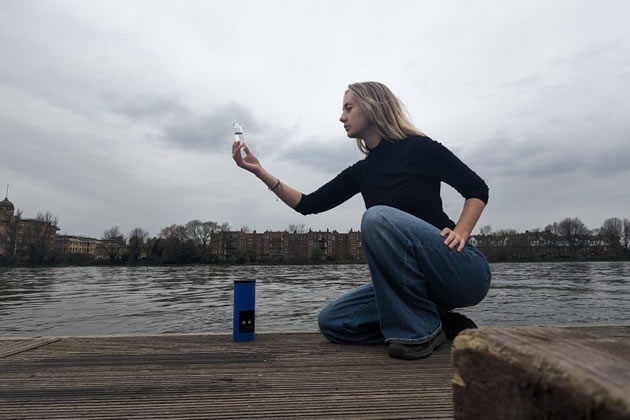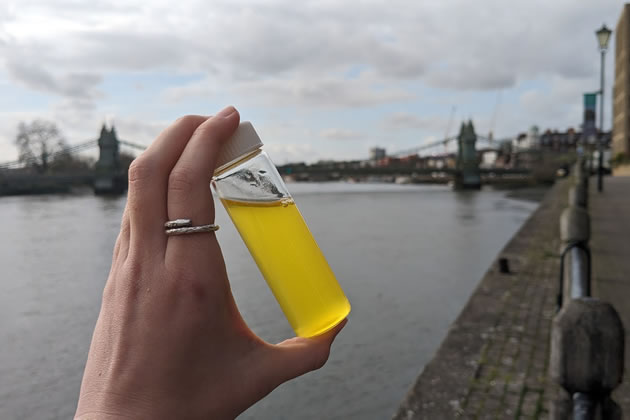Concerns Raised About Water Quality Ahead of Boat Race
Sir Steve Redgrave calls for urgent clean-up

River Action's Senior Communities Coordinator, Chloe Peck testing for E-Coli on the River Thames. Picture: River Action
April 9, 2025
Hopes that connecting up the Tideway Tunnel may have ended concerns about water quality in the River Thames have been called into question by recent tests.
Environmental campaign group River Action has published the results of recent measurements it has made on the course of the University Boat Race due to take place this weekend which shows that the water would be classified as ‘poor’ under environmental regulations if it were designated as a ‘bathing water’ site. The highest levels of pollution were recorded near Chiswick Bridge where the race ends.
Responding to the results Olympian Sir Steve Redgrave has called for further action to clean up the river and has urged the Oxford and Cambridge crews to refrain from the traditional celebration of throwing the boat’s cox into the water.
The so-called Super Sewer has ended the emergency sewage discharges into the river during times of heavy rainfall. According to figures from Thames Water, verified by the Environment Agency, there have been no outflows of foul water into the river since January.
River Action started testing the water for E.coli on 10 March and found that 29.5% of samples exceeded the safe limits for entering the water.
A total of 41 samples were taken along the course and the highest reading (2,267 colony-forming units /100ml) was recorded at Chiswick Bridge. This is more than twice the Environment Agency and World Health Organisation thresholds for safe recreation.
The campaign group says that treated wastewater from sewage treatment plants including the one at Mogden have no restrictions on E.coli content and it believes this accounts for the high readings.
In addition, a recent investigation by ChiswickW4.com revealed that foul water from misconnected sewers was being pumped into the river at outflows where emissions were not currently being monitored. Thames Water admitted that up to 10% of properties could be affected.
There are two classifications of water under current environmental legislation. One is for bathing and the other for recreation such as boating and rowing which are legally defined under the Bathing Water Regulations 2013 (which implements the EU Bathing Water Directive into UK law).
The Environment Agency monitors bathing sites from May to September testing for E.coli and Intestinal enterococci and giving them ratings ranging from Excellent to Poor. Only designated sites are held to these standards, and they are updated yearly.

Water measurements were taken along the course including near Hammersmith Bridge. Picture: River Action
For General Recreational Waters such as the River Thames no specific rating is given and water quality is governed by the Water Framework Directive (WFD) which is a piece of EU legislation which continues to be adhered to in the UK. The Environment Agency monitors the chemical and ecological status of these waters, but the standards are less strict regarding microbiological safety since direct immersion or ingestion is less likely for activities such as rowing.
The Mayor of London, Sir Sadiq Khan, has set an objective of a swimmable Thames, which would require it to be brought up to the standards of bathing water.
Sir Steve Redgrave said, “It’s a real worry that in 2025, unsafe water quality in the Thames is still a concern, Rowers, river users, and the public deserve better.”
River Action’s Head of Communities, Erica Popplewell, said, “The Mayor of London’s vision for clean and healthy rivers is simply a pipe dream without systematic reform of the water industry and its regulators. Right now, if the stretch of the Thames used for the Boat Race were an official bathing site it would be graded poor, the lowest possible rating. The government’s own advice for such water is ‘do not swim.’ So, we strongly suggest that the winning team on Sunday think twice before throwing their cox in the Thames.
“We would also urge all rowers to follow the ‘Guidance for Rowing When Water Quality is Poor’ safety guidelines to mitigate risk. The Boat Race should be about sporting excellence—not about worrying if you’ll get sick from being dunked – and attracting people to take up water sports as a healthy activity.
“The public demands Thames Water and regulators act now to improve sewage treatment infrastructure. Thames Water has profited from pollution for years whilst the Government have failed to enforce the law. It’s time to refinance the company without burdening bill payers and end pollution-for-profit. The decades-long water industry privatisation experiment has been a disaster. Thames Water should be put into Government hands and operated for public benefit. That process could start tomorrow with the right political will by putting Thames Water into Special Administration and restructuring the company.”
Thames Water responded to these concerns by pointing to recent measurements by Fulham Reach Boat Club which found the E.coli levels would be classed as excellent.
A statement from the company reads, “The boat race route is not a bathing water area and so we are not funded to routinely disinfect or sterilise final effluent.
“In addition, The Thames Tideway Tunnel has prevented 6,376,450M³ of sewage from entering the tidal Thames since it was connected earlier this year and will reduce the volume of discharges entering the tidal Thames in a typical year by 95 per cent.”
The Boat Race Company, which organises the event said, “Water quality remains an ongoing concern for The Boat Race, and we will continue to follow British Rowing’s Poor Water Quality Guidance to protect the health of our student athletes.
“This includes the covering up of open wounds, regular handwashing, showering as soon as possible after coming off the water, and highlighting the risks of entering the water.
“Clearly, the water quality testing carried out along the River Thames shows there is more work to be done to get our waterways where we all want them to be, but we are very encouraged to see the Tideway Tunnel fully operational which we hope will have a transformative effect on cleaning up the Thames.”
Like Reading Articles Like This? Help Us Produce More This site remains committed to providing local community news and public interest journalism. Articles such as the one above are integral to what we do. We aim to feature as much as possible on local societies, charities based in the area, fundraising efforts by residents, community-based initiatives and even helping people find missing pets. We’ve always done that and won’t be changing, in fact we’d like to do more. However, the readership that these stories generates is often below that needed to cover the cost of producing them. Our financial resources are limited and the local media environment is intensely competitive so there is a constraint on what we can do. We are therefore asking our readers to consider offering financial support to these efforts. Any money given will help support community and public interest news and the expansion of our coverage in this area. A suggested monthly payment is £8 but we would be grateful for any amount for instance if you think this site offers the equivalent value of a subscription to a daily printed newspaper you may wish to consider £20 per month. If neither of these amounts is suitable for you then contact info@neighbournet.com and we can set up an alternative. All payments are made through a secure web site. One-off donations are also appreciated. Choose The Amount You Wish To Contribute. If you do support us in this way we’d be interested to hear what kind of articles you would like to see more of on the site – send your suggestions to the editor. For businesses we offer the chance to be a corporate sponsor of community content on the site. For £30 plus VAT per month you will be the designated sponsor of at least one article a month with your logo appearing if supplied. If there is a specific community group or initiative you’d like to support we can make sure your sponsorship is featured on related content for a one off payment of £50 plus VAT. All payments are made through a secure web site. |